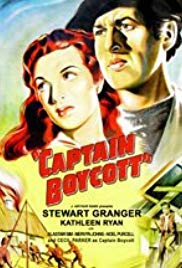
CAPTAIN BOYCOTT
93 minutes, Black-and-white.
Stewart Granger, Kathleen Ryan, Cecil Parker, Mervyn Johns, Alastair Sim, Robert Donat, Noel Purcell, Niall Mac Guinness, Eddie Byrne, Liam Redmond, Maurice Denham.
Directed by Frank Launder.
Captaiin Boycott was a film of the revival of the British industry after World War II, the looking back at the history of Ireland in the 1880s, in the aftermath of the potato famine, the dominance of the English landlords, high rents and evictions of the Irish, the campaigns of Parnell and the Land League for justice. The Irish Free State was established in 1948.
The film was written by Frank Launder, director of many films (and, in his later years, an obvious fan of St Trinian’s cartoons directing several of the films).
Cecil Parker is convincingly obnoxious as Captain Boycott. He belongs to those English landowners who feel that they are born-to-rule. In fact, he is quite unimaginative, relying on his manager played by Mervyn Johns. He is presumptuous, arrogant, evicting people at whim, installing other families in their place. One of such families is played by Niall Mac Guinness and Katherine Ryan. This leads to some confrontations and deaths.
Parnell in his speeches advocates ostracism, shunning people because of their injustice. When this happens, Boycott writes a letter to the Times, gets the British government involved, their sending the military, led by Maurice Denham, who eventually is disgusted with Boycott.
The hero of the film is played by Stewart Granger, landowner, romantic story with Katherine Ryan, owner of a race horse which is bought by Boycott and raced by him – with the farmers all converging on to the racecourse to thwart him in his victory.
There are good performances from Alastair Sim is the sympathetic parish priest and Noel Purcell as the teacher who is also a rebel rouser.
And Captain Boycott is immortalised in his name being incorporated into the English language.
1. Significant events in Irish history? The title and the focus, Captain Boycott, his name becoming part of the English language and its significance?
2. The Irish settings, County Mayo, 1880, the farms and the houses, the village, pubs, meeting places, the church? The rallies in the towns? The musical score?
3. Captain Boycott, the arrogance of the British, born to rule, as distain of the Irish, of the peasants, wanting people to know and stay in their place? Ownership of the lands, his home, servants, managers, workers in the fields? Military background, demanding (, unscrupulous, not listening to his workers? The experience of the boycott? His letter to the Times, the response of the British government, sending the troops to work the fields? Their behaviour, his dissatisfaction? His horse, the race, buying Hugh’s horse for 5 pounds? Riding the horse? The farmers, crowding on the course in protest? His socials, the reaction of the British commander, their withdrawal, his failure?
4. The situation in Ireland, British rule and dominance for centuries, the Irish becoming peasants? Ownership of the land? The presence of troops, the police? The poor crops, the potato famine, paying the rents, unable to find the money? The peasants being convicted, replacement farmers brought in? The desperation? Ready for revolt? The reaction in the 1880s? Later history?
5. The introduction to the family, the father and his coming to take over the farm, Anne and her son, the coach, the bag of grain, the concealed going, Hugh arriving, Anne tying the sack? The past history, the death of her brother? The family stances, taking over the farm, beholden to Boycott?
6. Hugh, his status in the area, his farm, his mother and her work, training the horse? The clash and his argument with Connell? Daniel and the meetings? At the dance, and giving him an alibi, Connell later at his house and not dead?
7. Daniel, the classes, the barefoot children, inciting them with the history, his leadership of the men, at Hugh’s place, relationship with the priest? The evictions, his going into action, the talk at the pubs, the hostility towards Parnell, going to hear him speak? The later angers, at the races, the men going onto the course? In the pub, the lynch mood, the death of Killain?
8. Hugh, the criticisms of Parnell and the Land League, going to hear him, Parnell’s speech, his reputation, the strategy of shunning and isolating people, ostracism? Hugh and the change of heart? The role of the priest, finishing Mass early so that people could go to hear Parnell?
9. The priest, his role in the village, his good advice, shrewd, sermons, discussions with Daniel, with Hugh? His mediation?
10. The men of the village, farmers, Michael Fagan evicted, people rallying for him, the later confrontation with Killain and the death of both?
11. Connell, his work for Boycott, against his own people, controlling Boycott, Boycott’s lack of imagination? The local discussions, his being seen at Mass – along with Hugh and the killer means?
12. The dramatic picture of the evictions and their effect? The racecourse and the demonstration? The lynch mob mentality?
13. Hugh, the touch of the romantic hero, love for Anne, helping her brother, defending the family at the end?
14. The importance of this kind of film to remind audiences about Irish troubles?